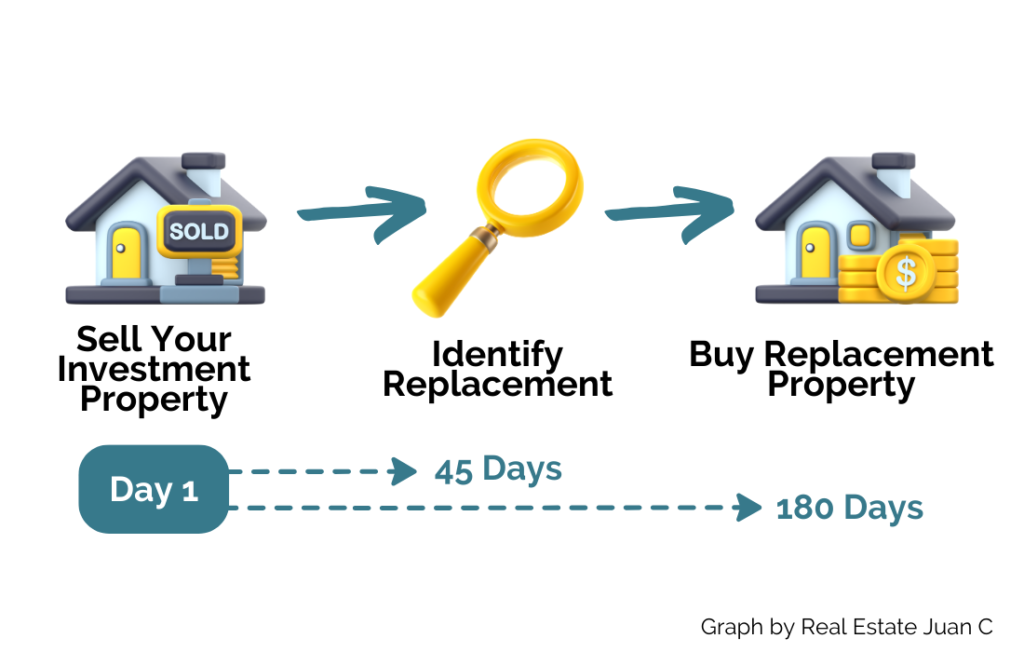Investing in real estate can be a highly profitable strategy that provides a solid return on investment. However, taxes are often a significant obstacle in the way of growing your wealth.
What if we told you that there is a smart strategy to postpone paying taxes when you sell a property? Welcome to the world of the Section 1031 Exchange, a powerful tool that allows you to defer paying taxes on capital gains and instead reinvest them to expand your wealth.
In this guide, we will show you in detail what the 1031 exchange is and how you can take advantage of it to minimize your tax liability. Get ready to discover an effective way to boost your real estate investments!
Table of Contents
ToggleWhat is a Section 1031 Exchange?
A 1031 Exchange is an IRS-approved transaction for investors to defer tax obligations on the sale of investment properties.
The name 1031 exchange derives from Section 1031 of the U.S. Internal Revenue Code.
It is a capital gain tax exemption that allows you to avoid paying capital gain taxes by reinvesting the proceeds in similar or greater value properties within a certain period.

Before using Section 1031, an investor must fully understand its complexities. According to the Internal Revenue Service (IRS), exchanges are limited to like-kind properties and vacation properties. Timing and taxation are also significant factors.
In effect for nearly 100 years, the 1031 exchange has been a popular investment option for thousands of investors. Investors can utilize tax deferral by reallocating their investments toward their goals while keeping equity ownership.
If you are considering a 1031 exchange or would like to find out more, read on.
Eligibility for 1031 Exchanges
Section 1031 of the tax code permits property owners to postpone taxes when they sell their business properties or investment properties.
One must be a tax-paying entity to qualify for an exchange. All taxpayers are eligible, including individuals, partnerships, limited liability companies, S corporations, C corporations, and trusts.
Since exchanges are not citizenship-required, anyone who pays taxes to the U.S. can participate.
Both foreign companies and DACA recipients must comply with these requirements.
The taxpayer must purchase replacement property simultaneously with selling retired property. In this case, the taxpayer is referred to by their tax identity, not necessarily by the name on their title to the property.
Taxpayers can remain tax-identifiable but not hold title to their properties by forming a “tax disregarded entity.” In effect, they do not separate themselves from their properties. The tax-exempt entities include single-member companies, beneficiaries of revocable living trusts, and tenants for hire.
Investors may also benefit from Delaware Statutory Trusts since they can access investment-grade properties that would otherwise be beyond their reach.
It is attributable to the taxpayer that he or she gains a fractional share in the property. IRS Revenue Procedure 2004-86 approves the use of Delaware Statutory Trusts in 1031 exchanges. Investing in like-kind property can defer tax gains if it meets the tax-deferred exchange requirements.
How Does Depreciation Affect a 1031 Exchange?
To truly appreciate the benefits of a 1031 exchange, it is essential to understand depreciation.
A depreciation schedule specifies what percentage is written off each year for investment property. The taxable capital gain is calculated by subtracting the cost of capital improvements from the original purchase price of the property.
Depending on how much the property sells for, you may have to recapture the depreciation. The amount of depreciation will therefore be charged to your taxable income at the time of sale.
A 1031 exchange may help you reduce taxable income as the amount of depreciation recapture increases over time.
Any 1031 exchange transaction must account for depreciation recapture to some extent.
Like-kind exchange types
A 1031 exchange is essentially an asset swap — it involves swapping one asset for another of comparable value and type. Depending on the circumstances, a 1031-like-kind exchange can be delayed, completed to suit, reversed, or a combination of the three.
Delayed exchanges
Deferred exchanges (also called delayed exchanges) make up the majority of 1031 exchanges since they require a 45-day identification period and a 180-day purchase period for new investments.
Build-to-suit exchanges
Building-to-suit 1031 exchanges enable investors to reinvest the proceeds from the sale of their property in a new property and enhance it. To qualify, the replacement property must fetch the same amount of money as the original property.
Reverse exchanges
Reverse exchanges involve the purchase of the replacement property before reselling the original property.
In most cases, a titleholder retains the asset on your behalf when you sell your previous home.
Other types of exchanges
The other types of exchange include the drop-and-swap and the tenancy-in-common.
A drop-and-swap exchange is used when working with partnerships. A drop-and-swap exchange occurs when a partner wants to cash out or invest in a replacement property.
Briefly, dropping a partnership means cashing out and dissolving it. Swapping is the process by which partners swap their interests in exchange for a replacement property.
Tenancy-in-common facilitates the pooling of capital and the purchase of a home by up to 35 investors.
Performing a 1031 exchange is possible for each individual using their share of the sale proceeds.
Section 1031 Exchange Time Frame
1031 Exchanges allow you to defer capital gains taxes and depreciation recaptures while investing in another “like-kind” property, also called trading up.
This allows you to defer the tax resulting from capital gain and depreciation recapture until you eventually have to pay it.
Of course, with the notable exception of inheritance, by using the entire proceeds to buy a new property. Thus, increasing the size of your portfolio at a faster rate than if you had to pay capital gains taxes every time you sold it.
Section 1031 exchanges require swift action. Following the sale of your home, you should immediately apply this wealth transfer strategy.
You must replace the first property you sell within 45 days. The 45-day period begins when the first property in the transaction closes.
It’s necessary to purchase a like-kind property within six months of selling your original property. As Section 1031 exchanges are subject to a limited timeframe, it is important to start looking early for potential exchange properties.
Qualified Intermediary
A qualified intermediary (middleman) can help you find a replacement property for the money you receive after selling your old one. Exchanges between three parties are referred to as swaps.
In general, QIs (Qualified Intermediaries) receive funds directly from property sales. In this case, you will be charged capital gains on your transaction.
QIs facilitate like-kind exchanges by assisting you with the logistics. You can use it to store funds until the like-kind property is ready to be purchased.
Related party exchanges
A Section 1031 exchange involving related parties is subject to a set of rules. A gain deferral applies to properties acquired from related parties through a Section 1031 exchange if they are held for at least two years.
Section 1031 Exchanges and Capital Gains
The reason why Section 1031 exchanges are popular is that they qualify you for a tax break on capital gains.
Generally, capital gains are taxable at 0%, 15%, and 20% on your federal income tax return when recognized from the sale of investment property.
In addition, recaptured depreciation can defer taxable income to the following year. When the replacement property is less valuable than the relinquished property, Section 1031 exchanges can still result in taxable gains.
Your next step with the 1031 exchange
The 1031 real estate exchanges offer a valuable opportunity to reduce short-term capital gains taxes and to make smart investments. The most notable thing is that you can repeat this process over and over again, enhancing your asset growth.
However, to make sound financial decisions and ensure you take full advantage of these benefits, it is crucial to have the guidance of a tax advisor. Likewise, a real estate agent can help you find the ideal properties for your exchange.
If you are ready to explore the investment opportunities available in your area and continue expanding your real estate portfolio, do not hesitate to contact us by calling (617) 729-2967 or by clicking here. We are here to help you achieve your financial goals and maximize your real estate investments!
By the way, if you would like to receive exclusive information about opportunities, we invite you to join our investor list. Stay on top of the latest opportunities and valuable tips to maximize your success in the world of real estate. Join the investor list here.
This article was last updated on October 31st, 2023.















![eBook How to Increase Home Value [7 Simple Ways]](https://realestatejuanc.com/wp-content/uploads/2022/03/FORMAS-WAYS-TO-INCREASE-YOUR-HOME-VALUE.png)